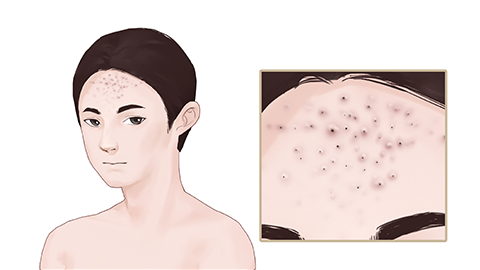How to deal with acne on the face
Generally, facial acne may be caused by improper cleansing, excessive sebum production, common acne (acne vulgaris), seborrheic dermatitis, hormonal imbalances, and other factors. It is recommended to seek medical advice promptly, identify the underlying cause, and improve the condition under a doctor's guidance through general management, medication, and other treatments. Detailed analysis is as follows:

1. Improper Cleansing: Accumulation of facial oil, dust, and residual cosmetics can clog pores and lead to acne, presenting as blackheads or whiteheads. Wash your face morning and night with a gentle cleanser, avoid over-cleansing, and use dedicated makeup removers after wearing makeup to thoroughly remove residues and reduce the risk of pore blockage.
2. Excessive Sebum Production: During puberty or due to consumption of spicy and greasy foods, sebaceous glands may produce excess oil, which can clog pores and form acne. Adjust your diet by reducing intake of spicy, fried, and high-sugar foods, increase consumption of fresh vegetables and fruits, avoid late nights, and help regulate sebum secretion.
3. Acne Vulgaris: Abnormal follicular keratinization and infection with *Cutibacterium acnes* (formerly *Propionibacterium acnes*) trigger inflammation, leading to acne and papules, commonly seen on the forehead and chin. Patients should follow medical advice to apply topical medications such as adapalene gel, tretinoin cream, or benzoyl peroxide gel to suppress sebum production and kill bacteria.
4. Seborrheic Dermatitis: Overactive sebaceous glands combined with *Malassezia* fungal infection can cause acne-like lesions, redness, flaking, and mild itching on the face. Under medical supervision, anti-inflammatory and antifungal treatments such as ketoconazole cream, miconazole and clobetasol cream, or tacrolimus ointment may be used.
5. Hormonal Imbalance: Elevated levels of androgens in the body stimulate sebaceous glands to produce more oil, triggering acne, possibly accompanied by irregular menstruation or hirsutism. Patients should follow medical advice to take medications such as spironolactone tablets, danshen酮 capsules, or isotretinoin soft capsules to regulate hormones and suppress sebum production.
In daily life, avoid frequently touching your face to prevent bacterial spread. When going outdoors, practice sun protection to reduce UV-induced skin irritation, choosing lightweight, oil-free sunscreen products. Maintaining regular skincare routines and a healthy lifestyle can help reduce acne formation and promote overall facial skin health.







